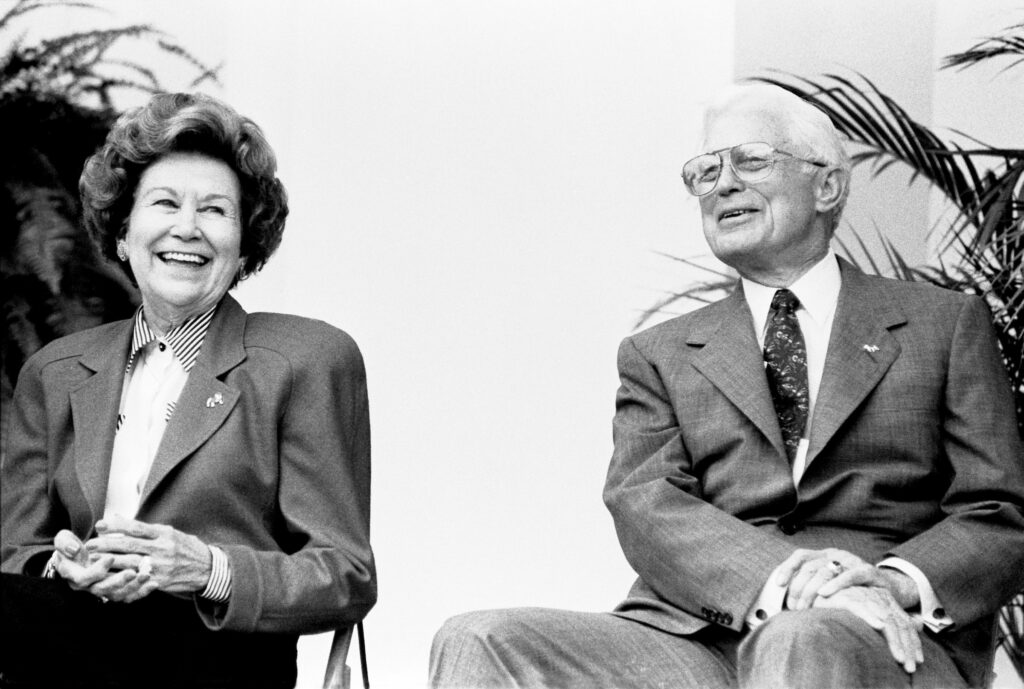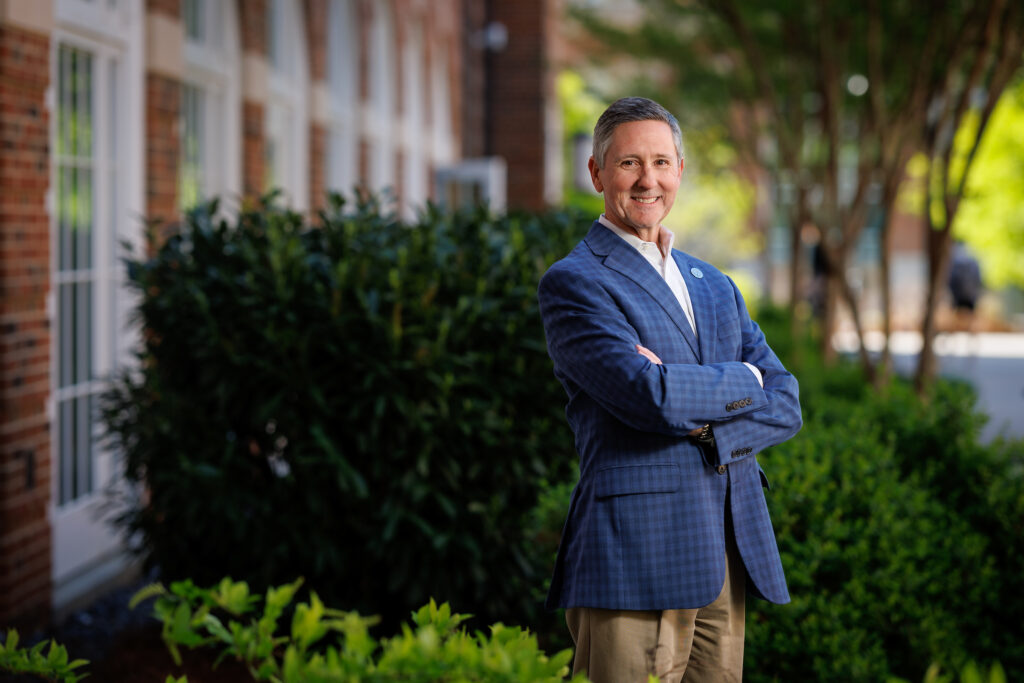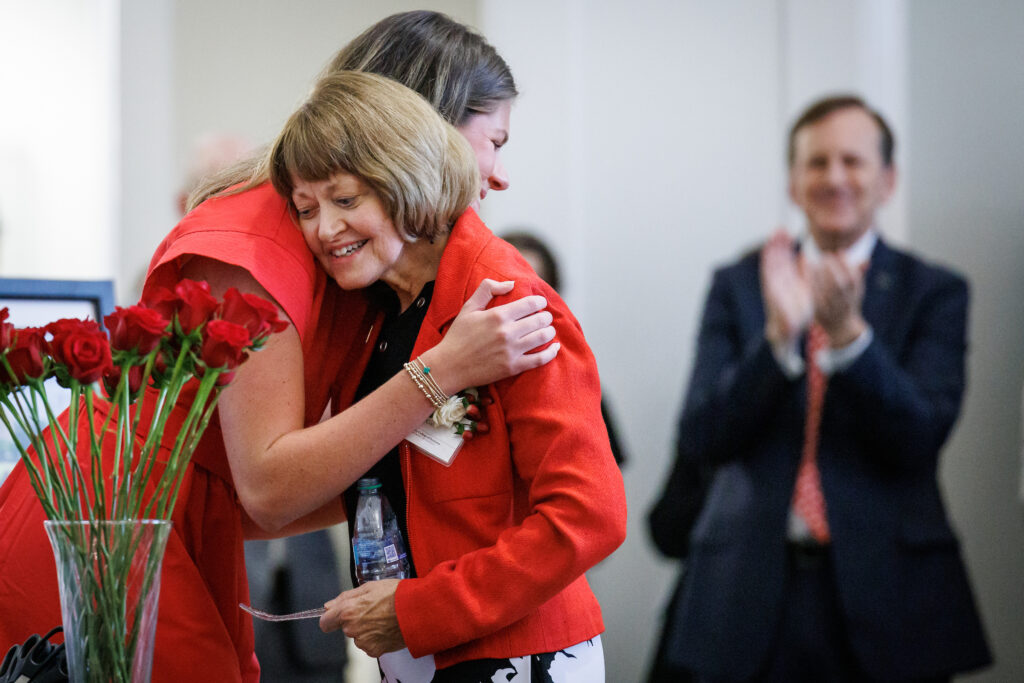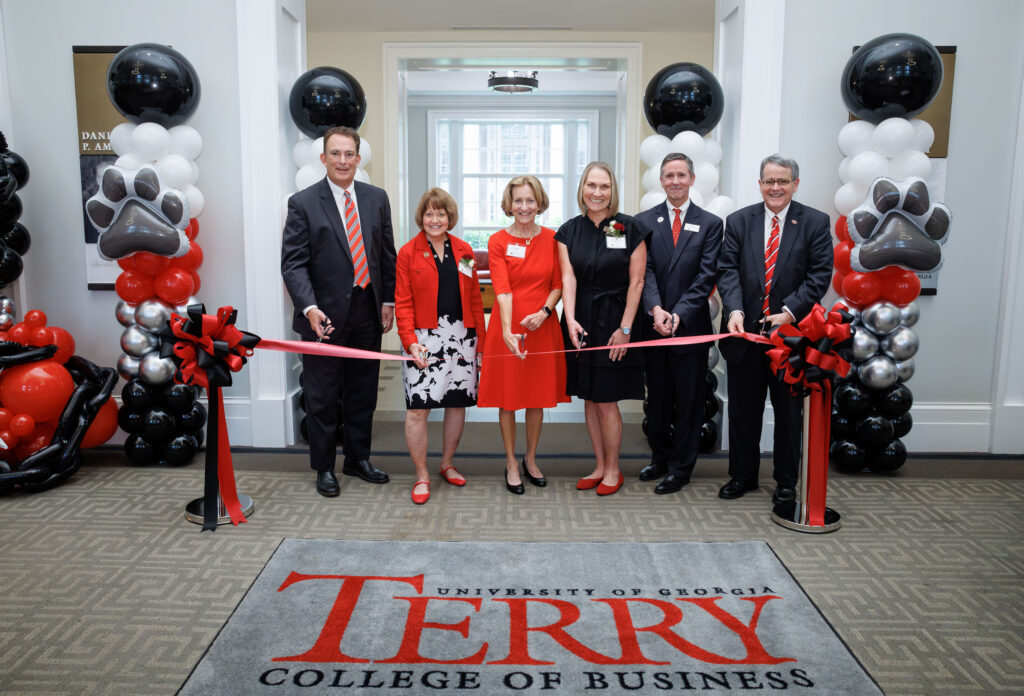The insurance business looked a little different when Herman Terry graduated from the University of Georgia in 1939.
The Great Depression did a number on the industry, with premiums shrinking and companies shuttering as demand flatlined in the wake of the financial collapse.
By the early ’40s, there were signs of life. The car was on the rise. Employer-sponsored health coverage was becoming commonplace. Perhaps ironically, the Social Security Act sparked innovation and competition among private insurers, as they raced to create new products to supplement the government-backed system.
Eighty-five years later, insurance and risk management is one of the world’s most robust industries, with thousands of firms doing business in the trillions of dollars each year.
“Insurance encourages us to do risky things,” says Jim Carson, the Daniel P. Amos Distinguished Professor of Insurance and director of UGA’s newly minted C. Herman Terry Risk Management and Insurance Program. “The whole purpose of the risk management industry is to serve society so it can take risks to make life better for more people.”
The Terry RMI naming — the result of a gift from the Terry Family Foundation creating a $15 million endowment to benefit the program — represents an important step forward for a program long viewed as a leader in its field.
“The Terry endowment gives us the ability to make major new strides in our mission to educate outstanding risk managers and insurance professionals who will become leaders in their organizations and in their communities, which is what Herman Terry stood for and exemplified as a graduate of the University of Georgia,” said Terry College Dean Ben Ayers.
You might say Herman Terry happened into a career in insurance. By all accounts, he was a natural, staying ahead of the market and carving out a highly successful career in a rapidly expanding industry.
With that success, he created a legacy that continues well into the 21st century.
A Foundation’s foundation
Herman demonstrated a strong work ethic from a young age, working the soda fountain in his father’s South Georgia pharmacy as a teenager. Graduating from Quitman High School, he enrolled at UGA, where he entered the School of Commerce and fell in love with the historic campus.
While working for Commercial Investment Trust of Thomasville after graduation, he fell in love with a young woman, too: Mary Virginia, a former high school classmate. The two married in 1941 and settled in what would become their permanent home of Jacksonville, Florida.
“My uncle was a leader in the Jacksonville community,” says Betsy Cox (JD ’80), the daughter of Herman’s sister, Betty, and president of the Terry Family Foundation. “Not only was he a well-respected business leader who served on various corporate and civic boards, including chairing the Jacksonville Port Authority for eight years, he also devoted a significant amount of time to improving the lives of others and served on a number of nonprofit boards.”
In his 30s, Herman joined financial company Atlantic Discount, overseeing its Dependable Insurance subsidiary, among other concerns. When an impending merger forced Atlantic to sell off its insurance businesses, Herman, sensing the growth potential, took out a large personal loan and purchased Dependable outright.
The gamble paid off. As president and chairman of the multifaceted Dependable Insurance Group, he gained a reputation as a canny executive, earning national recognition for inventive offerings including a plan protecting banks held liable under a seismic 1976 FTC ruling.
“We didn’t know what the effect of the law would be,” Herman told the Fort Myers News-Press in 1977, “so we wrote a conservative policy that would protect the bank under certain conditions.”
The plan proved popular, and the insurance business boomed. The company grew… and grew… and grew. In 1983, Herman sold the Dependable Group, by that point a publicly traded entity with multiple subsidiaries.

Rather than retire, he and Mary Virginia set their sights on giving back, actively participating on several boards and giving generously with their time and money. In the following decades, the Terrys became well known for supporting higher education, the arts, health care and children’s causes, among other philanthropic priorities.
“The Terry name is seen in a lot of places,” says Cox. “Herman gave more than money; he was somebody that brought other people to the table. He used his influence to further causes that were important to him.”
One of the couple’s main beneficiaries was the university Herman credited for his successful career. The C. Herman and Mary Virginia Terry College of Business was established in 1991. After Herman died in 1998, Mary Virginia remained a stalwart supporter until her passing in 2022.
Their name now lives on thanks to the Terry Family Foundation, which was the principal recipient of the Terrys’ estate and continues to support the causes Herman and Mary Virginia most valued.
“The Terrys were incredibly thoughtful philanthropists who invested wisely in community,” says Kathleen Shaw, the foundation’s executive vice president. “Our goal is to honor their legacy so we can ensure future generations have a great foundation to build on.”
A pioneering program
Founded in 1965 by professor E.J. Leverett, UGA’s Risk Management and Insurance Program was one of the first such programs in the United States. It quickly grew and remains the largest RMI program in the country, graduating around 300 students each year.
It’s also widely considered the cream of the crop. For the past five years, Terry’s RMI program has been ranked number one in the nation by U.S. News & World Report.
“The industry has told us, ‘We will hire every graduate that you produce,’” says Carson (PhD ’93), who was named head of Terry’s Department of Insurance, Legal Studies and Real Estate in 2023, succeeding Rob Hoyt, who led the department for more than 20 years.

By all measures, those graduates went on to shape the corporate world. Over the years, the program produced insurance icons such as Aflac CEO Dan Amos (BBA ’73), and leaders in finance, technology, health care and many
other industries.
“I think about the alumni that have come out of the program,” says Carson. “Well over 5,000 people going back 60 years. … Our students are (making an impact) very quickly, helping firms manage risk right out of college.”
The program’s focus is making sure students understand the fundamental role risk plays in business — and that it’s not just about insurance.
“We try to broaden their perspective,” Carson says. “While insurance might be a key component, it’s not necessarily the first thing we try to put into place … the goal is to manage risk in such a way that the need for insurance actually decreases.”
For large companies, risk managers influence nearly every major decision, including policy changes, product launches, and mergers and acquisitions.
They are particularly needed for pressing issues such as the increased rate and intensity of natural disasters, such as floods and wildfires. To meet this need, last year UGA partnered with Duke University to launch the Center for Innovation in Risk Analysis for Climate Adaptation and Decision-Making, or CIRCAD.
Co-directed by Terry RMI associate professor Marc Ragin, the collaborative center plans to bring together academic researchers and industry leaders “to help adapt to this changing risk landscape, build resilience, protect individuals and communities and address the financial challenges that accompany disasters,” says Ragin (BBA ’05).
“CIRCAD’s corporate membership model ensures its projects are relevant to key industries, research outputs can be immediately applied, and research development moves at the speed necessary to address the dynamic nature of risk from natural disasters.”
A bright future
One afternoon in late April, representatives from the Terry Family Foundation gathered in the Business Learning Community with a large crowd of university leaders, faculty, staff, alumni and students to celebrate the naming of the C. Herman Terry RMI Program.
“With this endowment, the C. Herman Terry Risk Management and Insurance Program is poised to move from the top-ranked program in the country to one of the best in the world,” UGA President Jere Morehead said at the ceremony. “Thanks to the Terry Foundation’s support, the RMI program will build on its track record of excellence, expanding its offerings as the largest undergraduate program of its kind, increasing resources for faculty pursuing important research, and providing even more experiential learning opportunities to students.”

Many of those students were in attendance, including third-year RMI major Hannah Higbea, who shared several examples of how the program’s faculty and alumni network played outsize roles in enhancing her college education thus far, helping to facilitate study abroad experiences and valuable industry connections.
“The legacy of the RMI program is built on a foundation of generosity, mentorship and excellence, and I am very proud to be part of it,” she said.
The rest of Higbea’s story, like Herman Terry in 1939, has yet to be written. But for her and her classmates, thanks to a foundation laid in 1965 and reinforced by a generous gift 60 years later, the sky’s the limit.
It begs a question: What would young Herman, fresh out of school, make of all this — a lengthy and fruitful career, a lasting philanthropic legacy, an ever-deepening impact on his beloved alma mater?
“He would be highly honored,” says niece Cox. “He attributed a lot of his success to his education at the University of Georgia. I think he would be incredibly proud of this investment, knowing what it’s going to do for so many people.
“It’s helping students, it’s helping faculty, it’s helping advance the college and the university. All of those things were really important to him and are now being continued by our foundation.”

